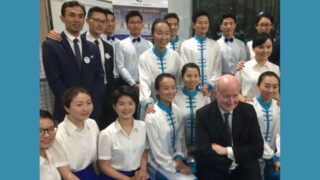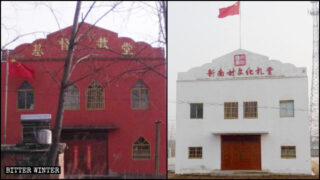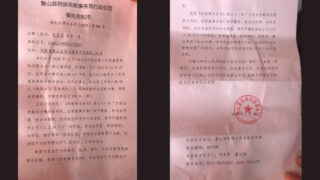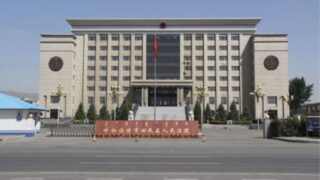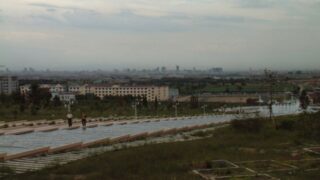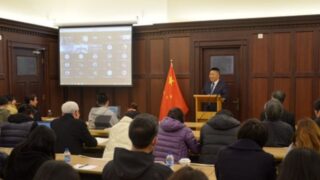The government forced to close these state-run places of worship in Heilongjiang Province’s Hegang city in the period of four months – from March to June.
by Zhou Hua
According to a report by the Bureau of Ethnic and Religious Affairs of Shuangyashan, a coal-mining city of the northern province of Heilongjiang, out of 135 active religious activity venues in the area, 128 were suppressed in 2018.
This year, the pace of crackdowns against the religious is not slowing down across the province, and Hegang, a city neighboring Russia, is no exception. According to personnel from the local United Front Work Department, only three Three-Self churches were allowed to remain in Hegang. All other meeting venues were shut down.
“This day came too fast. On June 9, the government uniformly shut down all unlicensed meeting venues in the district,” a Three-Self church pastor in Nanshan district of Hegang told Bitter Winter. “Even the government-approved Three-Self Church faces a challenging future.”


Gospel Church, a Three-Self meeting venue in Xing’an district with more than 100 congregants, received a government notice already at the beginning of the year: it was ordered to close before March 27.
“Every meeting venue was forced to sign a closure agreement before the date specified by the government,” said a believer from the church. “Venues that don’t sign it will be forcibly shut down. If they’re still holding gatherings after the indicated date, clerical staff and believers will be fined and detained.”
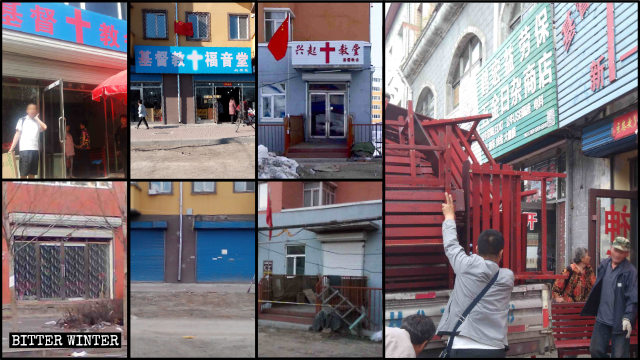

Just like in other regions, the meeting venues were shut down on a variety of trumped-up charges, like “disturbing the neighborhood” or because they were “too close to a school.” Some Three-Self church branches were legally licensed, but the government still shut them down, claiming that their registered address was different from their actual one. Pastors applied for a change of address, but the government wouldn’t approve their applications.
“This is a national trend. No matter whether you’re Christian, Buddhist or Catholic, every religion faces a similar fate,” said a local preacher. “Whatever offense the government accuses you of, you’re deemed guilty. Government personnel threatened to arrest and detain me if I’m ‘arrogant,’ meaning that I do not cooperate with them.”
So, why is the Communist Party afraid of Christians, Bitter Winter asked local believers. A house church preacher said that most of his congregation are elderly people in their seventies and eighties, and they cannot be regarded as a group that is willing to overthrow the government. “How are they hindering the government?” he asked. “Just like when Jesus was born, King Herod feared that Jesus would take power, so he killed all boys under two years of age. He just did it to keep his throne. It’s the same today. The CCP fears that people will rise and subvert its regime, so it suppresses us under the pretext of ‘cleaning up gang crime and eliminating evil,’ and won’t let us believe in God.”


“Christians aren’t against the government, but the Communist Party is suppressing them because it wants to be the only one in charge, above all else. That’s the Party’s mentality,” a local believer commented on the closure of churches. “The Lord is supreme, and the CCP wants to replace him; no contravening is allowed.”
“We held our final gathering on June 16. Many believers cried,” said a house church member. “One churchgoer used to bring her son, who has cerebral palsy, to attend gatherings. She wept uncontrollably. The church was like her home. What kind of feeling is it to lose one’s home!?”
The situation in Hegang city is merely the tip of the iceberg of Heilongjiang’s crackdowns on religious belief. According to reports, multiple meeting venues in the province’s cities of Mudanjiang, Dongning, Harbin, and Shangzhi have also been shut down by the authorities.



